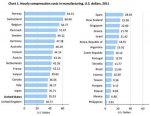- Joined
- Dec 13, 2015
- Messages
- 9,594
- Reaction score
- 2,072
- Location
- France
- Gender
- Male
- Political Leaning
- Centrist
The EU and Canada signed this last week a trade-agreement called CETA, whilst an identical treaty with the US is floundering. Both treaties are intended to expand trade between Europe and North America. But fundamental differences remain, and those differences revolve around "compensation" that exists between the US and EU.
The differences are fundamental in Europe's view, which seeks a "level playing field" between the US and the EU. The EU insists that employment compensation MUST INCLUDE in consideration coverage of fundamental social overhead in any negotiation of import duties - that is, a "level the playing field". It is out of income taxation, that such Social Overheads as free Health Insurance, Primary, Second and Tertiary Education are provided in Europe. As well as Social Insurance covering a great number of advantages unlike the US.
It is nearly impossible to negotiate trade-duties that regard entire portions of national GDP whilst such a wide difference exists between the US and EU.
The incompatibility between the US and the EU as regards "remuneration overhead components" are therefore far more different than they were with Canada (which has both National HeathCare Insurance as well as national funding of Tertiary Education).
Those fundamental differences in "total compensatione were examined in this study, from here: How U.S. Employee Benefits Compare To Europe's - excerpt:
PS: There is also a problem, which Canada was able to avoid, as regards agricultural trade. The US uses chemical compounds that are forbidden for human consumption in Europe.
The differences are fundamental in Europe's view, which seeks a "level playing field" between the US and the EU. The EU insists that employment compensation MUST INCLUDE in consideration coverage of fundamental social overhead in any negotiation of import duties - that is, a "level the playing field". It is out of income taxation, that such Social Overheads as free Health Insurance, Primary, Second and Tertiary Education are provided in Europe. As well as Social Insurance covering a great number of advantages unlike the US.
It is nearly impossible to negotiate trade-duties that regard entire portions of national GDP whilst such a wide difference exists between the US and EU.
The incompatibility between the US and the EU as regards "remuneration overhead components" are therefore far more different than they were with Canada (which has both National HeathCare Insurance as well as national funding of Tertiary Education).
Those fundamental differences in "total compensatione were examined in this study, from here: How U.S. Employee Benefits Compare To Europe's - excerpt:
The U.S. isn’t very competitive with other countries when it comes to taking care of its workers, according to a new report from Glassdoor.
Conducted in cooperation with London-based Llewellyn Consulting, the report, "Which Countries in Europe Offer Fairest Paid Leave and Unemployment Benefits?" shows a sharp divide between American workplace benefits and those offered in 14 European countries.
"In the U.S., workplace benefits like unemployment, maternity/paternity leave, and paid time off are part of the total compensation pie negotiated between employer and employee," said Glassdoor’s chief economist Andrew Chamberlain in a statement. "In most cases, the responsibility to provide these necessary social benefits to workers falls to U.S. employers rather than the government." This is in contrast to social policy across Europe, Chamberlain observed, which generally results in far more generous benefits than what is typical in the U.S.
With unemployment at historic lows, the general sentiment among workers is that they can find another, better job elsewhere, particularly among millennials, 44% of whom Deloitte found would leave their employers in the next two years. Benefits could make the difference between a talented employee staying or leaving to find a better package elsewhere.
A separate Glassdoor survey found that 79% of U.S. employees report they would prefer new or additional benefits instead of a pay raise, and more than half (57%) of people said benefits such as health insurance, paid vacation, paid sick days, and a retirement plan—some of which are mandated in European countries—are among their top considerations before accepting a job.
Using the United States as a benchmark, this study compared of benefits in six key areas:
Paid maternity leave
Paid paternity leave
General parental leave
Paid holiday allowances
Paid sick leave
Unemployment benefits
It’s important to note that Glassdoor analyzed the U.S.’s parental leave policy as stipulated under the Family and Medical Leave Act (FMLA), which also allows unpaid leave for reasons other than childbirth, such as caring for sick children, spouses, or elderly parents. This was reclassified as "general parental leave" rather than "maternity leave" or "paternity leave."
PS: There is also a problem, which Canada was able to avoid, as regards agricultural trade. The US uses chemical compounds that are forbidden for human consumption in Europe.
Last edited:

